Nobility - Study guides, Class notes & Summaries
Looking for the best study guides, study notes and summaries about Nobility? On this page you'll find 619 study documents about Nobility.
Page 2 out of 619 results
Sort by
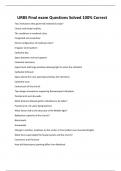
-
URBS Final exam Questions Solved 100% Correct
- Exam (elaborations) • 9 pages • 2024
-
- $11.89
- + learn more
Two institutions that governed medieval Europe? Church and feudal nobility The conditions in medieval cities Congested and unsanitary Street configuration of medieval cities? Irregular street pattern Cathedral bay Space between vertical supports Cathedral clerestory
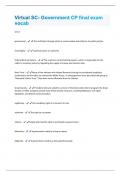
-
Virtual SC- Government CP final exam vocab Questions and Answers(A+ Solution guide)
- Exam (elaborations) • 33 pages • 2024
- Available in package deal
-
- $9.69
- + learn more
Unit 1 government - The institution through which a society makes and enforces its public policies Sovereignty - supreme power or authority Federal Reserve System - The country's central banking system, which is responsible for the nation's monetary policy by regulating the supply of money and interest rates Brain Trust - Many of the advisers who helped Roosevelt during his presidential candidacy continued to aid him after he entered the White House. A newspaperman once described the gro...
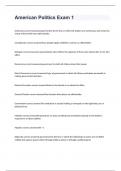
-
American Politics Exam 1 2024 with 100% correct answers
- Exam (elaborations) • 24 pages • 2024
-
Available in package deal
-
- $16.49
- + learn more
Aristocracy correct answersA government by the few, in which the leaders are meritorious and chosen by virtue of their birth into noble families. Constituents correct answersThose people legally entitled to vote for an officeholder. Delegate correct answersA representative who reflects the opinions of those who elected him or her into office. Democracy correct answersA government in which all citizens share their power Direct Democracy correct answersA type of government in which all...
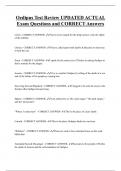
-
Oedipus Test Review UPDATED ACTUAL Exam Questions and CORRECT Answers
- Exam (elaborations) • 9 pages • 2024
-
- $9.49
- + learn more
Oedipus Test Review UPDATED ACTUAL Exam Questions and CORRECT Answers Creon - CORRECT ANSWER- I have never longed for the king's power, only the rights of the nobility. Chorus - CORRECT ANSWER- I have called upon both Apollo & Bacchus to intervene to heal the city. Priest - CORRECT ANSWER- I speak for the entire city of Thebes in asking Oedipus to find a remedy for the plague
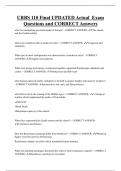
-
URBS 110 Final UPDATED Actual Exam Questions and CORRECT Answers
- Exam (elaborations) • 8 pages • 2024
- Available in package deal
-
- $7.99
- + learn more
URBS 110 Final UPDATED Actual Exam Questions and CORRECT Answers what two institutions governed medieval Europe? - CORRECT ANSWER- The church and the Feudal nobility what were conditions like in medieval cities? - CORRECT ANSWER- Congested and unsanitary What type of street configuration was characteristic of medieval cities? - CORRECT ANSWER- Irregular street patterns
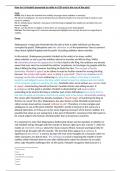
-
Grade 9 30/30 AQA essay on Macbeth. English Literature Paper 1
- Exam (elaborations) • 3 pages • 2024
-
Available in package deal
-
- $5.19
- 1x sold
- + learn more
This document consists of a full mark Macbeth answer answering 'How far does shakespeare present Macbeth as noble in Act 1 Scene 4 and the rest of the play?' Includes top analysis, great essay structure and argues the statement considering both sides but leans towards one side more than the other. At the end of the essay, there is a explanation why this essay was full marks which addresses all of the assessment objectives.
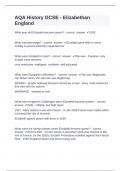
-
AQA History GCSE Question and answers correctly solved 2024
- Exam (elaborations) • 10 pages • 2024
-
Available in package deal
-
- $12.99
- + learn more
AQA History GCSE Question and answers correctly solved 2024 What year did Elizabeth become queen? - correct answer 1558 What was patronage? - correct answer Elizabeth gave titles to some nobility to ensure that they supported her. What were Elizabeth's traits? - correct answer She was - Cautious, only trusted close advisers Very indecisive, intelligent, confident, well educated What were Elizabeth's difficulties? - correct answer She was illegitimate - Her father Henry VIII ...
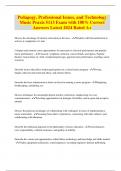
-
Pedagogy, Professional Issues, and Technology Music Praxis 5113 Exam with 100% Correct Answers Latest 2024 Rated A+
- Exam (elaborations) • 12 pages • 2024
- Available in package deal
-
- $12.48
- + learn more
Discuss the advantage of intrinsic motivation in the class - Students will find satisfaction in activity at completion of a task. Compare and contrast career opportunities for musicians in classical performance and popular music performance - Classical: symphony orchestra, concert bands, and operas. Popular: theaters, house band, etc. both: semi/permanent gigs, gigs/one time performance, teaching, union resources Describe factors that affect student participation in a school music program ...
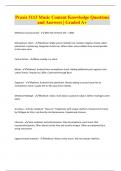
-
Praxis 5113 Music Content Knowledge Questions and Answers | Graded A+
- Exam (elaborations) • 27 pages • 2024
-
- $9.99
- + learn more
Medieval musical period - After fall of Rome 476 - 1300s Monophonic chant - Medieval. Single unison melodic line. Somber religious chants called plainchant or plainsong. Gregorian chants too. When other voices added, they moved parallel to the main voice. Cantus firmus - Main melody in a chant Motet - Medieval. Evolved from monophonic chant. Adding additional parts against main cantus firmus. Popular by 1200s. Continued through Bach. Organum - Medieval. Evolved from plainchant. Means addi...
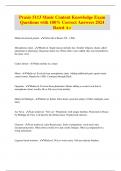
-
Praxis 5113 Music Content Knowledge Exam Questions with 100% Correct Answers 2024 Rated A+
- Exam (elaborations) • 26 pages • 2024
-
- $9.99
- + learn more
Medieval musical period - After fall of Rome 476 - 1300s Monophonic chant - Medieval. Single unison melodic line. Somber religious chants called plainchant or plainsong. Gregorian chants too. When other voices added, they moved parallel to the main voice. Cantus firmus - Main melody in a chant Motet - Medieval. Evolved from monophonic chant. Adding additional parts against main cantus firmus. Popular by 1200s. Continued through Bach. Organum - Medieval. Evolved from plainchant. Means addi...

How did he do that? By selling his study resources on Stuvia. Try it yourself! Discover all about earning on Stuvia


